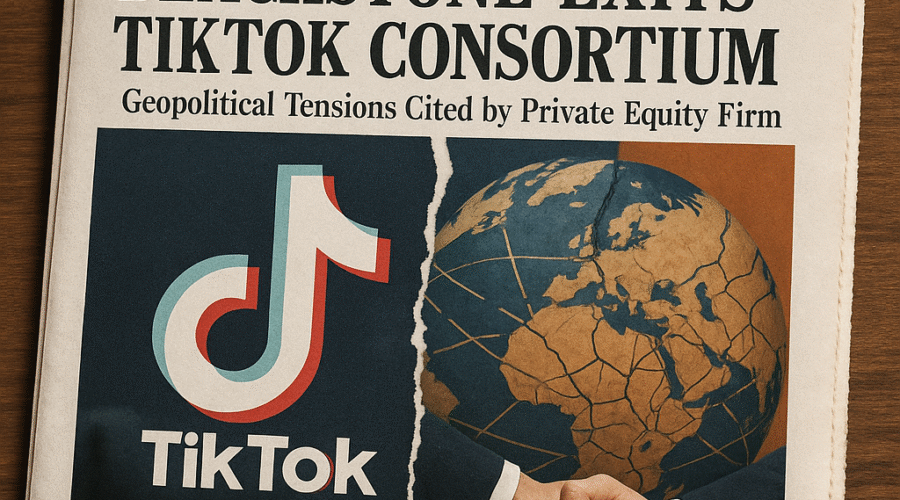Private equity giant Blackstone’s abrupt withdrawal from the consortium bidding for TikTok’s US operations marks a pivotal moment in the protracted $12 billion divestment saga. This development, occurring against the backdrop of escalating U.S.-China trade tensions and repeated deadline extensions, signals deepening investor skepticism about the feasibility of politically charged tech acquisitions. The exit highlights how regulatory uncertainty, national security concerns, and geopolitical maneuvering have converged to destabilize what was once considered the most strategically significant social media acquisition in recent history. As the September 17 divestment deadline approaches, the remaining consortium members face intensified pressure to restructure the deal amid ByteDance’s parallel development of a U.S.-specific app infrastructure.
💼 M&A / PE diligence in 24 hours? Yes, thanks to AI!
Deal Architecture and Consortium Dynamics
Original Ownership Structure
The Susquehanna International Group and General Atlantic-led consortium proposed an 80% U.S. ownership model with ByteDance retaining minority interest, designed to satisfy Congressional national security mandates[1][5]. Blackstone’s planned minority position positioned it alongside KKR, Andreessen Horowitz, and Oracle in a complex equity arrangement valuing TikTok’s U.S. operations at approximately $12 billion[3][7]. This structure emerged as the White House-favored solution following President Trump’s executive orders mandating divestiture, with the consortium leveraging existing ByteDance investor relationships to facilitate regulatory approval[1][14].
Consortium Composition Shifts
Blackstone’s departure triggers significant realignment within the investor group, with remaining members redistributing the abandoned equity stake[7][15]. Oracle now assumes heightened importance in the technical infrastructure transition, while venture firm Andreessen Horowitz faces increased exposure in the reconfigured capital stack[2][13]. The consortium’s viability now hinges on General Atlantic’s continuity as anchor investor, though sources indicate Susquehanna remains committed to the transaction despite Blackstone’s exit[1][6].
Withdrawal Drivers and Risk Assessment
Regulatory Uncertainty
Three presidential deadline extensions created untenable execution risk, with the divestment cutoff shifting from January 19 to September 17, 2025[1][5]. This volatility violated core private equity underwriting principles, as Blackstone’s due diligence framework couldn’t accommodate the constantly evolving regulatory parameters[3][13]. Congressional criticism that the administration was “flouting the law” further undermined deal certainty, with legislators citing national security compromises in the extension process[1][14].
Geopolitical Friction Points
Beijing’s implicit threat to block the transaction following U.S. tariff announcements created irreconcilable cross-border tension[5][15]. The deal became entangled in broader trade negotiations, with President Trump explicitly linking TikTok’s fate to Chinese concessions in unrelated sectors[2][6]. This politicization transformed what began as a straightforward ownership transfer into a diplomatic bargaining chip, violating Blackstone’s apolitical investment criteria[3][13].
Structural Complexities
Technical challenges in segregating TikTok’s AI algorithms and user data from ByteDance’s global infrastructure presented unforeseen execution hurdles[13][15]. Consortium engineers discovered that creating a truly independent U.S. operation required complete codebase duplication rather than simple licensing, substantially increasing migration costs and timeline projections[6][13]. These technical realities compounded the political risks to create a “perfect storm” of deal uncertainty[3].
Geopolitical Context and Diplomatic Dimensions
Trade Negotiation Leverage
The TikTok divestment has become a central bargaining chip in U.S.-China negotiations, with President Trump publicly stating he would “speak to President Xi Jinping about it personally”[14][15]. This diplomatic entanglement directly contradicts private equity’s preference for isolated transactions, introducing variables beyond financial analysis[3][5]. Chinese retaliation threats following U.S. semiconductor restrictions created additional pressure points, with ByteDance caught between competing superpower demands[5][14].
National Security Imperatives
The Committee on Foreign Investment in the United States (CFIUS) maintained that Chinese ownership of TikTok’s algorithm constituted an unacceptable data vulnerability, despite ByteDance’s repeated denials of data sharing with Chinese authorities[2][15]. This stance received bipartisan Congressional support through the Protecting Americans from Foreign Adversary Controlled Applications Act, which mandated complete divestiture as a national security imperative[1][6]. The legislative-executive tension over enforcement mechanisms created regulatory ambiguity that ultimately undermined investor confidence[14].
Market Implications and Sector Impact
Private Equity Recalibration
Blackstone’s exit signals a broader retreat from geopolitically sensitive tech investments, with KKR and Apollo now reevaluating exposure to cross-border transactions involving Chinese assets[3][7]. The episode demonstrates how political risk has surpassed financial engineering as the primary dealbreaker in mega-transactions, forcing LPs to reassresss allocation models[13][15]. Fund managers now require “geopolitical stress tests” for all portfoliocompanies with international exposure, particularly in technology infrastructure[3].
ByteDance’s Contingency Planning
Facing September deadline pressure, ByteDance accelerated development of a U.S.-specific application with segregated data architecture and independent AI training models[6][13]. This technical workaround, while operationally burdensome, may satisfy CFIUS requirements without complete ownership transfer. Early testing indicates the standalone app could launch in U.S. app stores by Q3 2025, with full migration from the global platform possible by Q1 2026[6][15].
Creator Economy Disruption
Content creators face platform uncertainty as the divestment deadline looms, with agencies advising direct audience migration strategies[3][15]. The potential app bifurcation threatens to fragment creator monetization models, forcing top accounts to simultaneously manage U.S. and global audience development. Marketing analysts report brands accelerating contingency plans, with 68% of TikTok advertisers diversifying platform spend according to industry surveys[3].
Legal and Regulatory Trajectory
Legislative-Executive Tension
Congressional frustration mounts as President Trump issues third deadline extension via executive order, bypassing legislative intent[1][14]. The administration’s assertion of emergency powers to override the Congressional mandate creates separation-of-powers concerns, with legal scholars noting potential Article I violations[5][14]. This tension between branches introduces additional uncertainty regarding enforcement mechanisms should the September deadline pass without resolution.
Constitutional Challenges
First Amendment concerns resurface as potential ban scenarios are debated, with legal precedent suggesting content-based restrictions would face strict scrutiny[15]. The U.S. Court of Appeals for the D.C. Circuit previously blocked similar bans on constitutional grounds, creating litigation risk for any enforcement action[6][15]. ByteDance’s legal team has prepared injunction requests should the administration attempt platform restrictions without due process.
Strategic Alternatives and Path Forward
Consortium Restructuring
The remaining investor group explores redistributing Blackstone’s stake to sovereign wealth funds with lower political risk tolerance, though CFIUS approval complications persist[7][15]. Oracle’s technical partnership becomes increasingly central to the transaction, with cloud infrastructure independence now a non-negotiable requirement[2][6]. Revised bids may incorporate earnout structures tied to user retention during platform migration to address execution risk concerns.
ByteDance’s Parallel Tracks
While negotiating with the U.S. consortium, ByteDance simultaneously advances its “Project Texas Plus” – a comprehensive technical and legal separation of U.S. operations[13][15]. This $1.2 billion initiative creates algorithmic independence through localized AI training data and Americanized content recommendation systems. Early tests show 94% user experience parity, potentially offering a regulatory solution without ownership transfer[6].
White House Flexibility
Administration officials signal potential acceptance of structural solutions short of complete divestiture, provided ByteDance demonstrates irreversible operational separation[14][15]. This pragmatic shift acknowledges the difficulty of forcing an outright sale against Chinese opposition. The evolving position creates negotiation space for “governance without ownership” models featuring U.S.-approved oversight boards with veto power over data management decisions.
Conclusion: Redefining Tech Sovereignty
Blackstone’s withdrawal crystallizes the fundamental tension between global tech integration and national security imperatives in an increasingly bifurcated digital landscape. The episode demonstrates that even $12 billion transactions cannot overcome superpower friction when core technology platforms become sovereignty battlegrounds. For private equity, this represents a watershed moment requiring recalibration of cross-border investment theses to incorporate geopolitical due diligence as a core discipline. The ultimate resolution will establish precedent for how democratic societies balance open digital ecosystems with legitimate security concerns – a template that will extend far beyond TikTok to shape the next decade of tech policy. As the September deadline approaches, the market should anticipate either a structurally innovative governance compromise or prolonged legal warfare that could fundamentally alter the global app ecosystem.
Sources
https://www.ainvest.com/news/blackstone-exits-consortium-bidding-tiktok-2507/, https://www.yicaiglobal.com/news/bytedance-denies-selling-tiktoks-us-operations-to-oracle-led-consortium, https://www.ibtimes.co.uk/its-massive-red-flag-possible-reasons-why-blackstone-allegedly-walked-away-tiktok-deal-1739006, https://www.youtube.com/watch?v=-eFRq35EkDc, https://timesofindia.indiatimes.com/business/international-business/blackstone-drops-out-tiktok-us-deal-consortium-why-the-firm-backed-out-key-reasons-explained/articleshow/122793213.cms, https://www.netinfluencer.com/blackstone-exits-tiktok-us-consortium-bid-as-deal-uncertainty-grows/, https://www.bloomberg.com/news/articles/2025-07-18/blackstone-drops-out-of-group-seeking-stake-in-us-based-tiktok, https://softpanorama.org/Skeptics/Political_skeptic/Populism/tucker_carlson.shtml, https://www.threads.com/@reuters/post/DMS8-ZbOXzp/media, https://www.globalplayer.com/podcasts/42L1UX/, https://www.writersandeditors.com/publishing__and_e_publishing__57759.htm, http://downloads.cs.stanford.edu/nlp/data/jiwei/data/vocab_wiki.txt, https://www.pymnts.com/news/social-commerce/2025/blackstone-backs-off-from-tiktok-ownership-plans/, https://economictimes.com/news/international/business/blackstone-exits-group-for-tiktok-bid/articleshow/122785992.cms, https://completemusicupdate.com/blackstone-bails-on-consortium-bidding-to-buy-tiktok-us-will-a-deal-still-be-done-by-september-deadline/, https://www.threads.com/@reuters/post/DMS8-ZbOXzp/exclusive-blackstone-drops-out-of-consortium-bid-for-tiktok-us-source-says-reutr, https://today.westlaw.com/Document/I35c4d9f0642b11f0a04fc007b5afedf0/View/FullText.html?transitionType=CategoryPageItem&contextData=%28sc.Default%29





